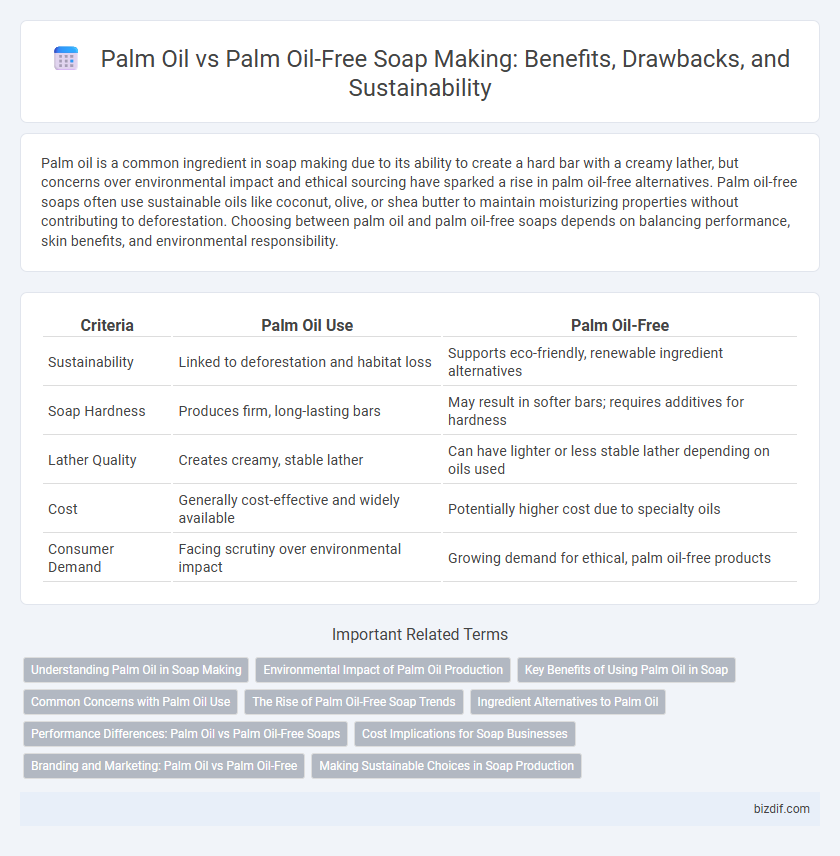Palm oil is a common ingredient in soap making due to its ability to create a hard bar with a creamy lather, but concerns over environmental impact and ethical sourcing have sparked a rise in palm oil-free alternatives. Palm oil-free soaps often use sustainable oils like coconut, olive, or shea butter to maintain moisturizing properties without contributing to deforestation. Choosing between palm oil and palm oil-free soaps depends on balancing performance, skin benefits, and environmental responsibility.
Table of Comparison
| Criteria | Palm Oil Use | Palm Oil-Free |
|---|---|---|
| Sustainability | Linked to deforestation and habitat loss | Supports eco-friendly, renewable ingredient alternatives |
| Soap Hardness | Produces firm, long-lasting bars | May result in softer bars; requires additives for hardness |
| Lather Quality | Creates creamy, stable lather | Can have lighter or less stable lather depending on oils used |
| Cost | Generally cost-effective and widely available | Potentially higher cost due to specialty oils |
| Consumer Demand | Facing scrutiny over environmental impact | Growing demand for ethical, palm oil-free products |
Understanding Palm Oil in Soap Making
Palm oil, rich in saturated fats, enhances soap hardness, lather, and longevity, making it a popular ingredient in traditional soap recipes. Palm oil-free soaps often rely on alternatives like coconut, olive, or shea butter oils, which provide different textures and moisturizing qualities without the environmental impact associated with palm oil production. Understanding the chemical composition and sustainability concerns of palm oil helps soap makers balance performance and eco-conscious choices in their formulations.
Environmental Impact of Palm Oil Production
Palm oil production is a leading cause of deforestation, habitat destruction, and significant carbon emissions, contributing to biodiversity loss and climate change. In contrast, palm oil-free soap formulations often rely on sustainable oils like coconut or olive oil, which generally have a lower environmental footprint. Choosing palm oil-free soaps supports reduced pressure on tropical rainforests and promotes more eco-friendly soap manufacturing practices.
Key Benefits of Using Palm Oil in Soap
Palm oil in soap provides exceptional hardness and a stable lather, enhancing the bar's longevity and user experience. Its natural antioxidants and vitamins E and A contribute moisturizing and skin-nourishing properties, making the soap gentle and beneficial for various skin types. Economically, palm oil is cost-effective and sustainably sourced options are increasingly available, supporting environmentally responsible soap production.
Common Concerns with Palm Oil Use
Palm oil is widely used in soap making for its affordable fatty acids that enhance hardness and lather, but concerns about deforestation, habitat loss, and human rights violations persist. Palm oil-free products appeal to environmentally conscious consumers seeking sustainable alternatives like coconut or olive oil, which also support eco-friendly practices and biodiversity. Transparent sourcing and certification, such as RSPO (Roundtable on Sustainable Palm Oil), address some issues but do not fully eliminate the sustainability debate in palm oil soap production.
The Rise of Palm Oil-Free Soap Trends
Palm oil-free soaps are gaining popularity due to increasing environmental concerns linked to palm oil production, including deforestation and habitat destruction. Consumers are seeking sustainable alternatives like coconut oil, olive oil, and shea butter, which offer moisturizing properties without ecological harm. The shift toward palm oil-free formulations reflects a broader movement for ethical cosmetics and transparent sourcing in the soap-making industry.
Ingredient Alternatives to Palm Oil
Palm oil-free soap formulations often rely on alternative oils such as coconut oil, shea butter, and olive oil, which provide moisturizing and cleansing properties without the environmental concerns linked to palm oil production. These substitutes offer similar fatty acid profiles that contribute to soap hardness and lather quality, ensuring effective performance in handmade soaps. By utilizing sustainably sourced, non-palm oils, soap makers can maintain ingredient quality while supporting deforestation-free practices.
Performance Differences: Palm Oil vs Palm Oil-Free Soaps
Palm oil soaps offer excellent hardness, long-lasting lather, and moisturizing properties due to their balanced fatty acid profile rich in palmitic acid. Palm oil-free soaps often use alternative fats like coconut, olive, or shea butter, which may result in softer bars and quicker lather but can vary in durability and moisturizing effects. Performance differences hinge on ingredients: palm oil contributes to a firm texture and creamy bubbles, while palm oil-free formulations require careful ingredient blending to match these qualities.
Cost Implications for Soap Businesses
Palm oil offers a cost-effective ingredient for soap production due to its widespread availability and affordable pricing compared to alternative oils. Palm oil-free soaps often rely on more expensive oils like coconut or olive, increasing overall production costs. Choosing palm oil or palm oil-free formulations directly impacts profit margins and pricing strategies within soap businesses.
Branding and Marketing: Palm Oil vs Palm Oil-Free
Brands using palm oil in soap emphasize sustainability certifications like RSPO to appeal to eco-conscious consumers while maintaining cost-effective production. Palm oil-free soaps leverage marketing strategies that highlight ethical sourcing and environmental benefits, targeting niche markets prioritizing deforestation-free products. Clear labeling and storytelling around ingredient origins play crucial roles in building consumer trust and differentiating products in competitive soap markets.
Making Sustainable Choices in Soap Production
Choosing palm oil-free ingredients in soap making reduces deforestation and habitat loss linked to unsustainable palm oil cultivation, supporting biodiversity conservation. Sustainable palm oil certification, such as RSPO, ensures traceability and environmentally responsible farming practices for soap manufacturers committed to eco-friendly products. Prioritizing alternative oils like coconut or olive oil can enhance the sustainability profile of handmade soaps without compromising quality or lathering properties.
Palm Oil Use vs Palm Oil-Free Infographic

 bizdif.com
bizdif.com